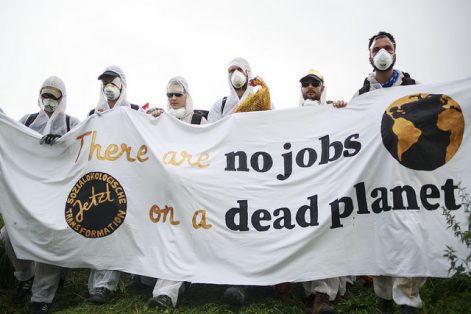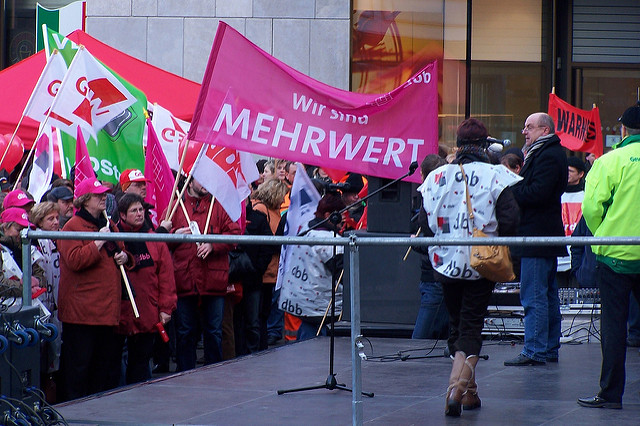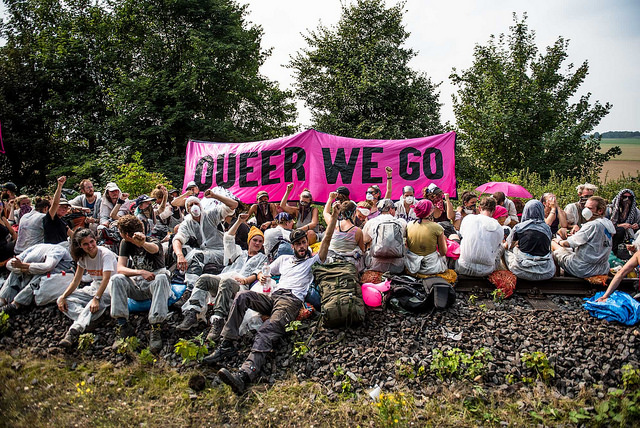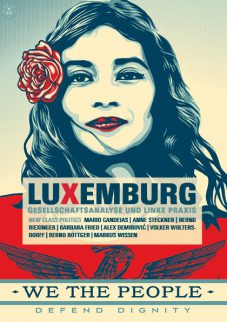| Ecological Class Politics
The Historical Contradiction between Ecology and Emanicipation [1]
Ecology and the emancipation of the working class are, considered in a historical sense, a contradiction. Or at least, that’s the case for the Global North. Local struggles for social and political rights, as Timothy Mitchelll (2011) demonstrates in his book Carbon Democracy, considerably profited from the fact that in the late 19th and early 20th Centuries, coal as an energy source began to play a prominent role economically. Coal was extracted from central deposits and transported to its place of destination through infrastructure such as railways and canals. Both the deposits as well as the infrastructure were highly vulnerable to labor struggles. Strikes in large workplaces by workers who were crammed together and thus easily able to organize, could paralyze an entire energy system. The energy source coal – the burning of which, as we now know, is significantly responsible for climate change – constituted at the same time the material basis for increasing the organizational and structural power of the working class.
Workers used their increased power in order to fight for political and social rights to an unprecedented extent. The historical compromise between labor and capital in the Global North – the acceptance in principle of the capitalist mode of production by the working class under the precondition of being able to share in the increased prosperity (or “social wealth”, as Marx called it) made possible by this mode of production and, within the framework of liberal democracy, being able to participate more strongly in politics – has to that extent a social-ecological downside: it is based upon the destruction of nature as well as the externalization of the consequences of this destruction in space and time: in space, because the carbon sinks that absorb the CO2 released in the Global North by burning fossil fuels are primarily located in the Global South (for example, in the form of large rain forests); in time, because CO2 emissions, due to their sheer magnitude, overload the absorption capacity of earth’s carbon sinks, so these emissions concentrate in the atmosphere and cause the climate change noticeable today and in the future.
With the increased importance of petroleum to advanced capitalist accumulation, the close connection between fossil fuels and social and political rights was weakened on the one hand, since the extraction and transport of oil is more capital-intensive than in the case of coal, and furthermore takes place via a network of locations, pipelines, and tanker fleets that is far less susceptible to targeted labor struggles than the centralized infrastructure of coal extraction and distribution. On the other hand, in many states of the Global North, the automobile industry ascended to the status of a key economic sector. The oil-fueled automobile went from being a luxury product to a mass product. It revolutionized the way of life for wage laborers, became the symbol of prosperity, constituted (male) identities and granted the working class new resources of power in initially strongly vertically integrated manufacturing. The ecological problem essentially remained the same. Fossil automobility is, similar to the coal-based generation of power and warmth, a significant driver of climate change. The structural and organizational power of the working class, which arose out of the automobilization of developed society under Fordism, was based upon ecological destruction as well as the oppression of democratic movements (in oil-producing countries for example by an alliance between political Islam and US imperialism).
In large parts of the Global North, coal mining is less important today, the infrastructure tailor-made for it is partially devalued. At the moment, the automobile industry is sliding further into crisis. However, notions of an attractive life connected to coal and later petroleum and the automobile, and the social compromises necessary to their realization, continue to have an effect. They are deeply rooted in everyday perceptions and practices, the social balance of forces, as well as state institutions and apparatuses. That is demonstrated in Germany not least by the manner in which the labor union IG Bergbau, Chemie, Energie – in close cooperation with the ministry of economics of participating German states – defends still-existing lignite opencast mines against closing them for urgent social-ecological reasons. And it is also demonstrated by the current crisis of the automobile industry, in which corporations, the state, and to some extent labor unions combat the fundamental transformation of an ultimately imperial – because based upon the disproportional appropriation of nature and labor-power (elsewhere) – form of mobility, albeit one that in the meantime is being increasingly converted to electric power.
So the connection between the ecological question and the question of class appears to take shape in a way that one can only be solved at the cost of the other. And, considered historically, it was ecology that was trampled underfoot, to the extent that the social and political emancipation of the working class was consummated and also mediated by an intensified domination of nature: an increased use of resources and an overstraining of carbon sinks. Today, however, both are threatened with being trampled underfoot. Capital production sets out, as Marx notes in Capital, to undermine “the original sources of all wealth – the soil and the worker.” (Capital I, p. 638)
The historical contradiction between ecology and the emancipation of subalterns thus does not necessarily rest upon a systematic one. The situation in many parts of the Global South has always presented itself differently. There, ecological destruction often does not serve social and political emancipation, but rather prevents it and intensifies asymmetries of class and gender relations. Conversely, social rights, which shape access to and control over land and resources in a more egalitarian way, not only constitute emancipatory end in themselves, but are also the key to a more reflexive handling of nature. Ecology and emancipation can therefore indeed stand in a co-constitutive relation to each other, rather than a contradictory one.
From a left perspective, in light of the destructive consequences of an “imperial mode of living” (Brand/Wissen 2017, 2018), it’s indispensable to identify the points of contact between ecology and emancipation and closely determine the contours of an ecological class politics (which we understand to be a constitutive component of a “new class politics”; see Brie/Candeias 2016). This presupposes disentangling the class question from its social democratic restriction to the participation by wage laborers in the fruits of economic growth, without therefore giving up the level of social and political rights already achieved in the Global North.
On the “Family Resemblance” between Social and Ecological Movements
The social preconditions for this appear to be given to the extent that what Alain Lipietz (1998) diagnosed as the “family resemblance” between social and ecological movements has increasingly come to the fore these days.[2] The reproduction of the working class in the Global North still profits from dominant access to cheap nature and labor-power worldwide. And the socially and ecologically destructive promises of the imperial mode of living still display a strong appeal. However, their redeemability has become increasingly questionable for many.
That is the difference between the Fordist social constellation and the current one, which some attempt to grasp with concepts such as “the society of downward mobility” (Nachtwey 2016): not only the expectation of growing prosperity and the expansion of participatory rights proves to be increasingly deceptive; even the maintenance of the given level of prosperity and participation is anything but guaranteed. The more countries such as China or India develop economically, the more they compete – socially and ecologically as well – with the early industrialized countries of the Global North for resources, labor-power, and carbon sinks, the use and exploitation of which first makes prosperity possible; and this at a time, in which the natural preconditions of this prosperity are eroding to a hitherto unprecedented extent. Moreover, the more the imperial mode of living destroys the conditions for life in large parts of the Global South, all the more strongly does the readiness increase to escape them by fleeing, in order to personally participate in the blessings of patterns of consumption and production, the costs of which have primarily been borne by those in the Global South.
The current popularity of right-wing parties and movements in the Global North, the expansion of security and military apparatuses and the permanent attacks on central institutions of liberal democracy can be understood as political phenomena of this changed constellation. The “society of externalization” (Lessenich 2016) threatens to lose its outside, and with it, an important foundation for processing its internal contradictions. The predominant reaction to this consists in defending or restoring this threatened outside – and with it, the exclusivity indispensable to the imperial way of life – in an authoritarian manner: through policies of sealing nations off from refugees and the endeavor of keeping geopolitical and economic climbers down through trade policy or even militarily. This politics of authoritarian stabilization finds its societal counterpart in strategies of adjustment on the part of the upper middle and upper classes, in which the automobile and automobility policies play a central role. Hence the SUV boom – between 2008 and 2015, the share of these cars in the total of German passenger vehicles more than doubled (BMVI 2015, pp. 135ff) – can be understood as a symbolic expression of the endeavor to steel oneself against increasing social and ecological adversity. With the SUV, I can reassure myself of my social position; I stand – or rather, sit – in the truest sense of the word above all others (as long as they aren’t driving an even bigger specimen). Driving an SUV is a gesture of superiority. It reinforces the claim of being able to take hold of nature and labor-power in a disproportional way at a global level. Already the tank-like form of the automobile underscores the will of its owner (or the social class to which he belongs) to defend the exclusivity of the imperial mode of living by any means necessary.
What’s paradoxical about that is that the phenomena whose consequences one tries to adapt to as best as possible – ecological crisis, increasing societal competition, and exacerbated international tensions – are first generated and strengthened by the form of adaptation itself. The automobile industry can be understood as a thoroughly “paradoxical industry” (Nieuwenhuis/Wells 2003, p. 15) in the first place: on one hand, it is characterized by the almost permanent revolutionizing of management concepts, production models, and product ranges; on the other hand, its dominant position in the economic development models of the Global North is as stable as the systems of industrial relations (and thus worker participation) developed by it appear to be resistant to Change.
The SUV boom, which in 2009 elevated the automobile industry out of its deep economic crisis, since SUV sales commanded above average profits, is to that extent emblematic of the simultaneity of crisis and persistence in the imperial mode of living. Moreover, it stands for a constellation in which the class character of this mode of living once again comes to light precisely due to the attempts to stabilize it in an authoritarian-exclusive manner. These days, the disproportional access to resources, carbon sinks, and labor-power worldwide only conditionally serves the processing of the class antagonism in the Global North. Despite all statements by right-wing, conservative, neoliberal, and fossil-fuel oriented social democratic re-discoverers of “social imbalances” and questions of justice, the defense of “our way of life” has become a class project. In terms of perspectives, it not only intensifies the ecological crisis and imperialist competition, but also social and political inequality in the Global North itself, in that it creates the possibility for a few to adapt to the increasingly rough climate at the cost of many. The objectified ruthlessness of the SUV, with which the class conflict on the roads is once again being heated up after decades of mass automobilization, is an expression of this constellation. It demonstrates that the prosperity and rights of many no longer depend upon the perpetuation, but rather upon overcoming the imperial mode of production and living and its socially and ecologically destructive consequences.
Since the 1990s, the class compromise in the automobile industry has lost its driving role in terms of comprehensive collective bargaining agreements. Agreements on employment and site protection no longer set trends for gradualist progress and the constant expansion of class compromises, but rather offered a signal to other branches for the imposition of interest-driven regression. “That things are ‘status quo’ is the catastrophe” noted Walter Benjamin in his Arcades Project (p. 473). The catastrophe is a standstill, the “continuity of history”, the apparent stability of existing compromises between social classes, of which only the shell still exists, and which in terms of their content were honed by capital’s interests in valorization.
With Marx, we must understand cyclical economic crises to be the necessary expression of the contradictions of the capitalist mode of production, which constantly push it toward dead ends. Also with Marx, however, we must proceed from the insight that “capitalist production constantly strives to overcome these immanent barriers, but it overcomes them only by means that set up the barriers afresh and on a more powerful scale.” (Capital III, p. 358) What is new is that the barriers of capital have linked up with the barriers of nature to constitute a new barricade which can no longer be overcome by any solution that “carries on” as usual. That’s why it’s true that “Red is only possible with Green, justice only with ecology” (Thie 2013, p. 12). This is the historical-social context in which ecological class politics becomes both urgent and possible at the same time, and the historical contradiction between ecology and emancipation can be superseded.
Starting Points for Ecological Class Politics
Nonetheless, ecological class politics is not at all automatic. It still seems more obvious, and moreover linked to less uncertainties, to defend the current state of affairs. That doing so only more rapidly erodes its preconditions and that these ultimately only become available to a well-off minority who can steel themselves against – or extricate themselves from – the forthcoming social-ecological upheavals is an insight that only dawns very slowly upon people’s consciousness. In the current situation, ecological class politic is therefore primarily a strategic challenge confronting the social and political left in social movements, labor unions, and parties, in order to overcome the “robust chain of fortresses and casements” (Gramsci) around the dominant model of development.
Marx had already identified in principle such strategic challenges for socialist class politics. In The 18th Brumaire of Louis Bonaparte he notes that “men make their own history” but at the same time asserts that “they do not make it under circumstances chosen by themselves, but under circumstances directly encountered, given and transmitted from the past.” (MECW 11, p. 103) That means that the path to a better future has to “fight its way out”. (Abendroth 1982, p. 28) It is not itself the overcoming of the reigning mode of production and living, but levels its terrain. The point is to start with experiences of inequality and politicize them, so that both concrete improvements in the working and living situations of people as well as structural changes and breaks are made possible. In this sense, one can speak of a “double transformation” (Klein 2013) or of an “offensive double strategy” (Brie/Candeias 2016).
We see two reasons why this challenge is acceptable in the current historical configuration, why it does not constitute an “individual quirk” (Gramsci), but is rooted in the “mines” laid by the old society, without which – according to Marx – no emancipatory perspective is able to detonate: “if we did not find concealed in society as it is the material conditions of production and the corresponding relations of exchange prerequisite for a classless society, then all attempts to explode it would be quixotic.” (Grundrisse, p. 159) That’s also the case for transcending the historical antagonism between ecology and emancipation.
“Upheavals take place in dead end streets” (Brecht) – according to the theory of the Regulationist school, a distinction can be made between a crisis within a socio-economic mode of development and a crisis of a mode of development, which cannot be overcome with ingrained practices. The latter expresses itself in the crisis of the automobile industry. The strategies for overcoming the crisis that revolve around E-mobility are merely maneuvering towards another dead end, and furthermore overturn the last remnants of class compromises that were still enshrined in the Global North. The initiated capital-immanent conversion from the internal combustion engine to an electric motor will cause a dramatic shift in the existing structures of hierarchy and linkages of the automobile value chain. With the successive conversion of propulsion technology, central fields of competence not only of final manufacturers, but also of central suppliers are becoming to some extent irrelevant: no transmissions, no valves, no crankshafts, no alternators, no turbochargers, etc. The de-materialization of production in the Global North linked to E-Mobility is already threatening the facilities of suppliers of internal combustion engines. At the same time, new strategic actors are arising within the “industrial complex”, and its structures of compromise, that has up to now been concentrated around the companies of the automobile industry: new providers/competitors and new suppliers, primarily of storage and digital technology, with considerably different capital-labor relationships and working conditions. The interest politics of final manufacturers is also reaching its limits: the Future Pact 2025 at Volkswagen foresees specific Centers of Excellence for the new propulsion technologies at individual facilities; however, paired with a planned increase in productivity of 25 percent, 14,000 jobs in Germany are to be eliminated already by 2020 (see: MITBESTIMMEN! Zeitung des Volkswagen Betriebsrates, November 2016). Even saving jobs no longer appears possible within the ingrained practices of workplace class and interest politics. Of course, the existing power of works councils and labor union structures can be used to try to shape the looming radical structural transformation of final manufacturers in the same corporatist manner that has been deployed up to now, bringing in one’s own suggestions – but only at the price of submitting to the goals of the business, which cannot be called into question from the subaltern position of “junior partnership as a backseat passenger, far from the steering wheel.” (Streeck 2016, p. 58) Experience shows that increasingly rigorous concessions wrested from workforces can no longer be averted in the usual (workplace) corporatist way. It’s also possible, however, that the looming constriction of the space for workplace compromise will be used to breath new life into the concept of a democratic conversion. In this way, ecological class politics can generate new forms of class solidarity beyond a tendency toward “fractal” labor union politics, oriented towards protecting jobs and facilities that is hardly successful anymore (Dörre 2011) and tap into resources of power that were increasingly spilled away in the old development model. “Unions need to reinvent themselves as social movements, not only responsible for the working conditions of their members, but for their general living conditions as well.” (Räthzel/Uzzel 2011: 1221)
“The true barrier to capitalist production is capital itself.” (Capital Volume III, p. 358) Interests of valorization and profit in automobility are today ending up in extreme contradiction to the material and ecological interests of human beings. Marx spoke of the “double character” of labor as concrete labor producing use-values and abstract labor producing exchange value, where in the capitalistically form-determined mode of production, the concrete usefulness of products is merely a necessary appendage of its surplus-value producing component. Today, a use-value orientation of expended living labor appears more urgent than ever. This orientation entered into class-political conflicts for the first time in the 1970s and 1980s. When redundancy plans became known in the British company Lucas Aerospace, highly dependent upon defense contracts, the (various) labor unions at the company constituted a common “shop stewards combine committee”, which in 1976 developed a plan to reorganize production – the corporate plan (thermal pumps, ultrasound devices, hybrid motors). It was understood to be an element in the struggle for “the right to work on products which actually help to solve human problems rather than create them.” For the first time, a labor union struggle to save jobs was linked to a struggle to develop a new product range. During the crisis in the West German shipbuilding industry, the first Arbeitskreis Alternative Produktion (Working Group on Alternative Production) was founded in Autumn 1981 at Blohm und Voss AG in Hamburg. Until the mid-1980s, over 40 such workplace working groups were founded in West Germany – not only in Bremen, Hamburg, Emden, or Kiel, but also in Nuremberg at AEG. They followed the pattern of British praxis: shop stewards and works councils activated all sections of the workforces and then worked together to come up with alternative production concepts. All working groups ran up against a structural barrier: the right of disposition by owners of capital in the means of production, resulting from existing property relations. The owners of capital did not want sovereignty over production concepts taken out of their hands. An ecological class politics must also raise anew the question of democratic control over production policy. It can give the signal for (once again) linking struggles for improvements in the conditions of wage labor with strategies for overcoming labor determined from outside by capital. And it can pave the way for a change of direction not only in automobile policy, but also blaze the trail leading to another mode of production and living.
Translated by Alexander Locascio
References
Abendroth, Wolfgang, 1982: Die Bedeutung von Otto Bauer und Antonio Gramsci für die Diskussion der Eurolinken, in: Detlev Albers (Ed.): Kapitalistische Krise und Strategien der Eurolinken. Fragen einer sozialistischen Politik in Westeuropa, Berlin, 25–33
BMVI, 2015: Verkehr in Zahlen 2015/16. Hamburg: Bundesministerium für Verkehr und digitale Infrastruktur, www.bmvi.de (30.5.2016)
Brand, Ulrich/ Wissen, Markus, 2017: Imperiale Lebensweise. Zur Ausbeutung von Mensch und Natur im globalen Kapitalismus, München
Dies., 2018: The Limits to Capitalist Nature. Theorizing and Overcoming the Imperial Mode of Living, London (forthcoming)
Brie, Michael/ Candeias, Mario, 2016: Rückkehr der Hoffnung: Für eine offensive Doppelstrategie, in: LuXemburg, November 2016, legacy.zeitschrift-luxemburg.de (24.8.2017)
Dörre, Klaus, 2011: Funktionswandel der Gewerkschaften. Von der intermediären zur fraktalen Organisation, in: Thomas Haipeter/Klaus Dörre (Hrsg.): Gewerkschaftliche Modernisierung, Wiesbaden, 267–301
Jürgens, Ulrich/ Krzywdzinski, Martin, 2006: Globalisierungsdruck und Beschäftigungssicherung. Standortsicherungsvereinbarungen in der deutschen Automobilindustrie zwischen 1993 und 2006, WZB – discussion paper SP III, 206-303, Berlin
Klein, Dieter, 2013: Das Morgen tanzt im Heute. Transformation im Kapitalismus und über ihn hinaus, Hamburg
Lessenich, Stephan, 2016: Neben uns die Sintflut: Die Externalisierungsgesellschaft und ihr Preis, Berlin
Lipietz, Alain, 1998: Die politische Ökologie und die Zukunft des Marxismus, in: ders.: Nach dem Ende des „Goldenen Zeitalters“. Regulation und Transformation kapitalistischer Gesellschaften, hrsg. von Hans-Peter Krebs, Hamburg, 59–76
Marx Engels Collected Works (MECW). London
Marx, Karl, 1973: Grundrisse, translated by Martin Nicolaus, London
Marx, Karl, 1976: Capital Volume I, translated by Ben Fowkes, London
Marx, Karl, 1981: Capital Volume III, translated by David Fernbach, London
Mitchell, Timothy, 2011: Carbon Democracy. Political Power in the Age of Oil, London/New York
Nachtwey, Oliver, 2016: Die Abstiegsgesellschaft. Über das Aufbegehren in der regressiven Moderne, Berlin
Nieuwenhuis, Paul/ Wells, Peter, 2003: The Automotive Industry and the Environment, Cambridge
Streeck, Wolfgang (2016): Von Konflikt ohne Partnerschaft zu Partnerschaft ohne Konflikt: Industrielle Beziehungen in Deutschland, in: Industrielle Beziehungen, 23. Jg. H. 1, 47-60
Thie, Hans, 2013: Rotes Grün. Pioniere und Prinzipien einer ökologischen Gesellschaft, Hamburg
Notes
[1] The authors hereby thank the members of the discussion group on the “Future of the Automobile Industry” of the Rosa-Luxemburg-Stiftung for suggestions and criticisms.
[2] In the 19th and early 20th century, the ecological question was already a class question, to the extent that workers felt the ecological and health consequences of industrialization in their workplaces and neighborhoods more strongly than members of the middle and upper classes.







